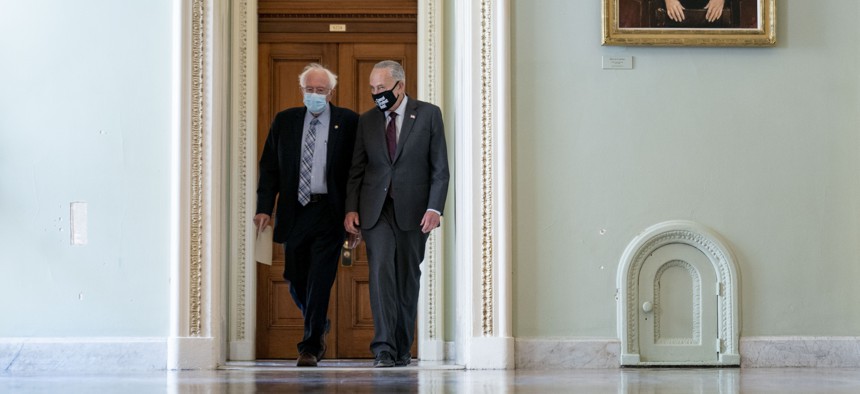Senate Democrats Release $3.5T Budget Framework with Affordable Housing, Climate Funding

Sen. Bernie Sanders, I-Vt., left, and Senate Majority Leader Chuck Schumer of N.Y., right, walk out of a budget resolution meeting at the Capitol in Washington, Monday, Aug. 9, 2021. AP Photo/Andrew Harnik
Sen. Majority Leader Chuck Schumer has set a Sept. 15 deadline for committees to draft legislative text for the proposal, which will fund domestic initiatives.
Senate Democrats on Monday released an outline of a $3.5 trillion budget framework that will boost spending on social and education programs and environmental initiatives—marking the next spending battle on the horizon after the infrastructure plan.
The measure, which reflects many of the priorities outlined in President Biden’s American Families Plan, would include funding to expand universal pre-K, provide free tuition at community colleges, expand public housing options, establish a Civilian Climate Corps, and add dental, hearing and vision benefits to Medicare.
“At its core, this legislation is about restoring the middle class in the 21st Century and giving more Americans the opportunity to get there,” said Sen. Majority Leader Chuck Schumer in a letter sent to senators Monday to explain the plan. “By making education, healthcare, childcare, and housing more affordable, we can give tens of millions of families a leg up.”
The introduction of the budget framework comes as the Senate moved Monday to end debate on the $1 trillion infrastructure bill, setting up a potential vote on the proposal as early as Monday evening.
Documentation released by Schumer’s office includes topline spending priorities and provides a broader list of initiatives and funding allocations to be included in the proposal than has previously been made public. With the release of the budget outline, Democrats can begin the formal process of writing the bill.
Overall, the proposal calls for $3.5 trillion in spending over 10 years, which would be paid for through a combination of new tax revenues, health care savings, and long-term economic growth. Any new taxes on families who make less than $400,000 a year, small businesses or family farms are off the table for negotiations, according to Schumer’s plan.
The budget framework includes instructions and spending targets for individual committees, including:
- $332 billion for the Banking Committee, which will be tasked with investing in affordable housing, the Housing Trust Fund, rental assistance programs and community investment through block grant and other programs.
- $726 billion for the Health, Labor, Education and Pensions Committee to expand pre-K, free community college, increase Pell Grant awards and invest in workforce development and job training.
- $198 billion for the Energy Committee to provide for clean energy development, pay for consumer rebates to weatherize and electrify homes, and promote climate research.
- $135 billion for the Agriculture Committee to establish the Civilian Climate Corps, expand child nutrition programs, and create agriculture, drought and forestry programs to help reduce carbon emissions and prevent wildfires.
- $67 billion for the Environment and Public Works Committee to fund a clean energy technology accelerator program, invest in clean vehicles, increase federal investment in energy efficient buildings and green materials.
Democrats plan to use a legislative process known as budget reconciliation to advance the progressive agenda, meaning only a simple majority is necessary to pass the bill. But while the infrastructure proposal has bipartisan support, Republicans and even some moderate Democrats, like Joe Manchin of West Virginia and Kyrsten Sinema of Arizona, have expressed opposition to the cost of the plan.
Schumer has set a target date of Sept. 15 for committees to submit suggested legislative text for the bill and said that Senate committees will work with the House to write the legislation.
Andrea Noble is a staff correspondent with Route Fifty.
NEXT STORY: Governments Sinking Millions Into Training Unemployed Residents for High-paying Jobs





